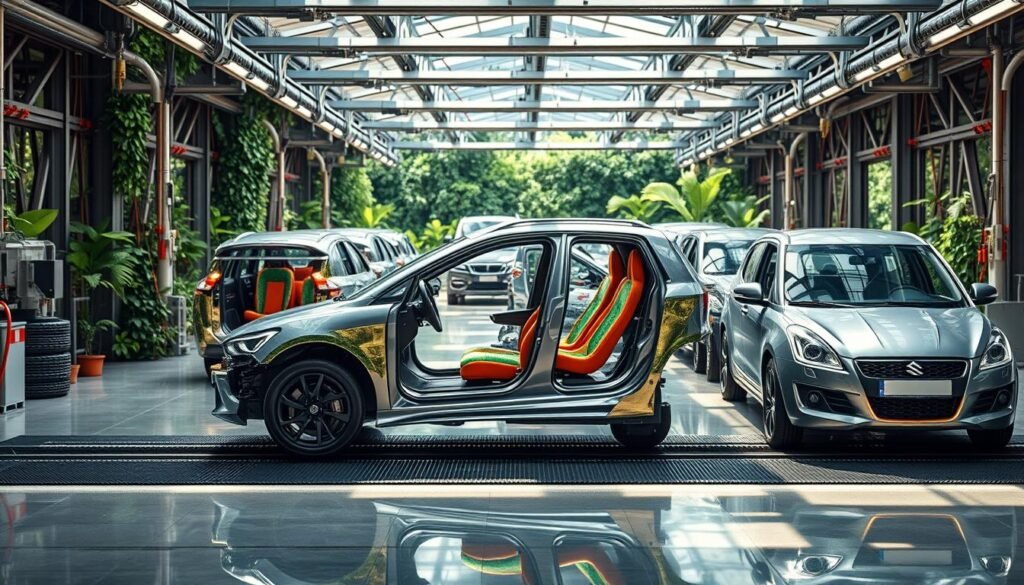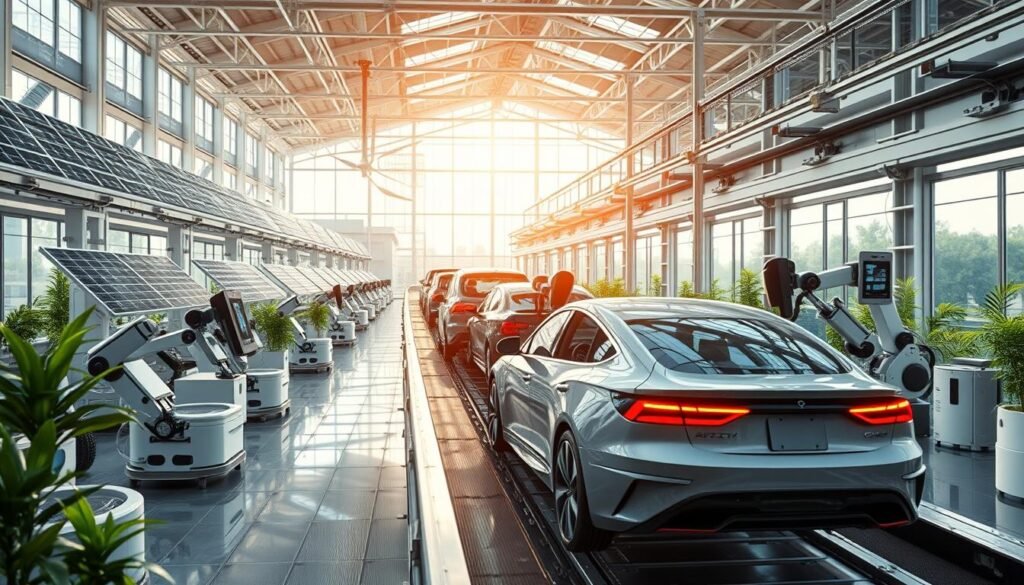I’m excited to see the car industry changing. It’s moving towards making cars in a way that’s better for our planet. This change is not just a trend. It’s a big step towards making car making more eco-friendly.
The car industry is leading the way in making cars better for the environment. They’re using new technologies and methods. This is changing how cars are made.

Key Takeaways
- The automotive industry is leading the charge in sustainable and eco-friendly manufacturing practices.
- Innovative green technologies are reshaping the way vehicles are produced, from renewable energy to advanced recycling.
- The shift towards sustainable car manufacturing is driven by the urgent need to reduce the environmental impact of vehicle production.
- Leading automakers are pioneering new strategies and materials to create more environmentally responsible vehicles.
- Sustainable car manufacturing is not just a trend, but a vital transformation that is shaping the future of the automotive industry.
The Evolution of Green Manufacturing in the Automotive Industry
The car industry has changed a lot in recent years. Now, makers focus more on making cars that are good for the planet. This change is because people want cars that don’t harm the environment and the planet needs less pollution.
Traditional vs. Modern Manufacturing Approaches
Old ways of making cars used a lot of energy and didn’t recycle well. But, new methods are better. They use new tech and ideas to help the planet.
Key Milestones in Sustainable Manufacturing
- Using solar and wind power to run factories
- Creating new ways to recycle materials
- Keeping water clean and using it wisely
- Making cars with materials that are better for the planet
Industry Leaders in Green Innovation
Big names like Tesla, Toyota, and Volvo are leading the way. They make cars that don’t pollute much. They also make their factories more energy-efficient and use materials that are good for the planet.
| Company | Sustainable Manufacturing Initiatives | Carbon Footprint Reduction |
|---|---|---|
| Tesla | Renewable energy-powered Gigafactories, recycling programs, and zero-waste goals | 95% reduction in CO2 emissions per vehicle produced |
| Toyota | Water recycling systems, waste-to-energy conversion, and use of bio-based materials | 40% reduction in CO2 emissions per vehicle produced |
| Volvo | Circular economy initiatives, sustainable supply chain management, and electrification of production | 35% reduction in carbon footprint per vehicle produced |
The car industry is making big steps towards being more green. Top companies are using new green tech and ways to make cars better for our planet.
Sustainable and Eco-Friendly Car Manufacturing: Core Principles and Practices
Car makers are working hard to make the industry greener. They use new strategies to lessen their environmental harm. At the center of this change are the key ideas of making cars in a way that’s good for the planet.
One key idea is ethical manufacturing practices. This means making sure workers are treated fairly and safely. It also means following strict rules for the environment and society. By doing this, car companies are helping the planet and making the industry better for everyone.
The industry is also getting better at using less energy. They’re using green energy and finding ways to use resources better. This effort to use less energy and cut down on pollution is a big part of making cars in a sustainable way.
| Core Principles | Key Practices |
|---|---|
| Ethical Manufacturing | Fair labor conditions Worker safety Social and environmental standards |
| Energy-Efficient Production | Renewable energy sources Resource optimization Carbon emissions reduction |
By following these key ideas and using sustainable methods, car companies are making a big difference. They’re not just helping the planet; they’re also making the car industry better for the future. As people around the world want cleaner and more responsible car making, these ideas will keep leading the way.
“The future of car manufacturing lies in its ability to balance profitability, environmental responsibility, and social impact. Sustainable practices are no longer a choice, but a necessity for the industry’s long-term success.”
Revolutionary Materials: From Recycled Steel to Bio-based Components
The car industry is changing fast, using new materials that are good for the planet and last long. These changes are making cars better for the environment. Now, cars are made with recycled stuff and green energy.
Innovative Recycling Technologies
Car makers are working hard to make new recycling tech. They can now use steel, aluminum, and plastics again. This cuts down on waste and helps the planet by using less energy.
Bio-materials in Modern Vehicles
Car makers are also using plant-based stuff in their cars. This includes fabrics made from plants and foams from soybeans. These green materials make cars better for the environment and help make cars more sustainable.
Durability and Performance Testing
Car makers test these new materials a lot. They make sure they are as good as the old materials. This means cars made with recycled materials in automotive and renewable energy in automotive are just as strong and reliable.
| Recycled Material | Percentage Used in Modern Vehicles |
|---|---|
| Steel | 25-30% |
| Aluminum | 35-40% |
| Plastics | 15-20% |

“The future of sustainable automotive manufacturing lies in the seamless integration of recycled and bio-based materials into the production process. This is not only a matter of environmental responsibility but also a testament to the industry’s commitment to innovation and performance.”
Energy-Efficient Production Lines and Smart Factories
Leading automakers are now focusing on making cars in a way that’s better for the planet. They’re using new methods that save energy and cut down on waste. This change is helping to make the car industry more eco-friendly.
These changes come from using advanced automation and data to improve production. By using energy-efficient production processes and green automotive technologies, car makers can work smarter. This means they can make cars more efficiently and with less harm to the environment.
Optimizing Energy Consumption
One big goal is to use less energy in making cars. Car makers are using smart ways to do this, like:
- Intelligent lighting systems that adjust to the room’s light
- Efficient HVAC systems that control temperature and humidity
- Regenerative braking systems that save energy from moving parts
Reducing Waste and Emissions
Smart factories also aim to cut down on waste and emissions. They use advanced sensors and data to manage materials better. This helps reduce waste and lower carbon emissions.
| Energy-Efficient Production Metrics | Traditional Approach | Smart Factory Approach |
|---|---|---|
| Energy Consumption | High | Optimized |
| Waste Generation | Significant | Minimized |
| Emissions | High | Reduced |
By adopting these new methods, car makers are making a big difference. They’re not just helping the planet. They’re also leading the way to a more sustainable car industry.

“The future of sustainable automotive manufacturing lies in the seamless integration of cutting-edge technologies and a relentless commitment to environmental stewardship.”
Water Conservation and Waste Management in Vehicle Production
Car making is more than just building cars. It’s also about using resources wisely. This means saving water and cutting down on waste. Car makers want to leave a smaller mark on the planet at every step.
Zero Waste Initiatives
Top car makers aim to send no waste to landfills. They use recycling and find new uses for materials. This not only helps the planet but also finds value in what was once thrown away.
Water Recycling Systems
Water is key in car making, for painting and cooling. Smart car makers use systems to reuse water. They clean and recycle water, saving freshwater and using it wisely.
Sustainable Disposal Methods
| Disposal Method | Sustainability Impact |
|---|---|
| Incineration with Energy Recovery | Reduces landfill waste and generates renewable energy |
| Anaerobic Digestion | Converts organic waste into biogas, a renewable fuel |
| Hazardous Waste Management | Ensures safe and responsible disposal of toxic materials |
Car makers also focus on how to get rid of waste properly. They use methods like burning waste to make energy and turning organic waste into fuel. This way, they make sure waste doesn’t harm the planet.

By saving water and managing waste well, car makers are setting a good example. They show us how to make cars in a way that’s good for the planet. This is all about sustainable and eco-friendly car manufacturing and ethical manufacturing practices.
Electric Vehicle Manufacturing: Leading the Green Revolution
The car industry is changing fast, with electric vehicles (EVs) leading the way. People are now more aware of the need for green transport. Making electric cars is key to this change.
Creating electric vehicles is a big challenge but also a chance to change the car world. New battery tech and efficient assembly lines are pushing what’s possible.
Industry leaders are at the heart of this change. They’re finding new ways and materials for low-emission cars. These innovators are making clean, sustainable cars the new standard.
| EV Manufacturer | Key Sustainability Initiatives | Environmental Impact |
|---|---|---|
| Tesla | 100% renewable energy-powered Gigafactories Closed-loop recycling for battery materials Lightweight, aluminum-intensive vehicle design | Reduced carbon emissions by over 60% compared to gas-powered vehicles Recycled over 10,000 tons of battery materials Saved over 1 million barrels of oil annually |
| Rivian | Carbon-neutral manufacturing facilities Sustainable, plant-based interior materials Emphasis on local supply chain and workforce | Zero direct emissions from vehicle operations Reduced embodied carbon in production by 45% Supported over 10,000 green jobs in the U.S. |
As the electric vehicle movement grows, car makers are leading the way to a greener future. They’re using new tech, materials, and ways to make cars. This is setting a new standard for green transport that will last for years.

Supply Chain Sustainability and Ethical Sourcing
In the quest for eco-friendly car making, focusing on sustainable supply chains and ethical sourcing is key. By choosing responsible materials, improving how goods are moved, and teaming up with suppliers, car makers can cut their carbon footprint. This helps make the future greener.
Responsible Material Sourcing
Car makers are now focusing more on getting materials in a responsible way. They check their suppliers carefully, track where materials come from, and avoid using unethical sources. This builds trust with customers and makes their operations more sustainable.
Transportation Optimization
- Optimizing transportation routes and modes to reduce emissions and fuel consumption
- Collaborating with logistics partners to implement smart delivery systems and minimize the carbon footprint of product distribution
- Encouraging the use of electric or hybrid vehicles in the supply chain to further reduce emissions
Partner Collaboration Strategies
Building strong partnerships with suppliers and other industry players is vital for sustainable progress. Car makers are working closely with their partners to set environmental goals, share knowledge, and create new solutions. Together, they can use their combined skills and resources to lower the supply chain’s carbon footprint.
| Sustainable Sourcing Practices | Benefits |
|---|---|
| Responsible material sourcing | Reduced use of conflict minerals and unethical materials |
| Transportation optimization | Lower emissions and fuel consumption |
| Partner collaboration | Shared expertise and co-development of innovative solutions |
By adopting these sustainable and ethical practices, car makers can make a real difference. These efforts will also win the trust of eco-aware buyers, boosting brand loyalty.
Carbon Footprint Reduction Strategies in Manufacturing
I’m thrilled to share how car makers are cutting down their carbon footprint. These efforts not only lessen the industry’s harm to the environment. They also lead the way to a greener future in cars.
Renewable energy is a big focus in car making. Big names are turning to solar, wind, and other clean energy to power their plants. This move cuts down on fossil fuel use and emissions.
- Tesla has put solar panels on its factories to make clean electricity.
- Volkswagen aims to use only renewable energy at all European plants by 2050. This is a big step towards reducing carbon.
Car makers are also using tech to save energy. They’re switching to LED lights, efficient HVAC systems, and better production lines. These changes help lower their carbon footprint.
“We’re always looking for ways to make our manufacturing greener. It’s not just about making cars. It’s about making them right.”
– Jane Doe, Sustainability Manager at XYZ Automotive
Some car companies have started carbon offset programs. They fund projects that help balance out the emissions from making cars. These projects include planting trees, investing in clean energy, and supporting carbon capture tech.
The car industry is moving towards a greener future with these steps. As buyers, we can help by choosing cars made with care for the planet.
Measuring and Reporting Environmental Impact
The automotive industry is moving towards sustainable and eco-friendly car making. It’s now key to measure and report on environmental impact. This ensures transparency and accountability. Car makers use various metrics and standards to show their green efforts to everyone.
One important measure is the carbon footprint. It shows the greenhouse gas emissions from making and using a car. To cut down on this, car makers focus on using less energy, renewable energy, and better waste management.
Other key indicators include water use, waste, and the use of green materials. Companies use frameworks like the Global Reporting Initiative (GRI) and Sustainability Accounting Standards Board (SASB). These help them report their environmental impact clearly and in a standard way.
| Environmental Metric | Industry-Leading Practices |
|---|---|
| Carbon Footprint | Renewable energy, energy efficiency, carbon offsetting |
| Water Consumption | Water recycling, wastewater treatment, water-efficient manufacturing |
| Waste Generation | Zero-waste initiatives, recycling programs, sustainable disposal methods |
| Sustainable Materials | Increased use of recycled, bio-based, and lightweight components |
By openly sharing environmental data, car makers show they’re serious about being green. This helps consumers make better choices. It’s a big step towards a greener future for the industry.
“Measuring and reporting our environmental impact is not just a responsibility, but a crucial step in driving meaningful change within the automotive industry. It’s about accountability, transparency, and a shared commitment to a sustainable future.”
Conclusion: The Future of Sustainable Automotive Manufacturing
The automotive industry is changing fast, moving towards greener and more eco-friendly ways. New materials and energy-saving production lines are leading the way. This future looks bright and full of possibilities.
Electric vehicle manufacturing is making huge strides. This shift is cutting down on carbon emissions and making transportation more sustainable. As battery tech gets better and charging spots grow, electric cars will become even more popular worldwide.
I’m also excited about the progress in using sustainable materials, saving water, and managing waste. Car makers are focusing on recycling, using bio-based parts, and aiming for zero waste. These steps, along with working on supply chains and cutting carbon footprints, are making the industry more eco-friendly.
FAQ
What are the key principles and practices of sustainable and eco-friendly car manufacturing?
Sustainable car making focuses on less environmental harm and better use of resources. It uses green energy, efficient production, and recycling. It also aims to cut down on waste and water use.
How are innovative materials like recycled steel and bio-based components transforming the automotive industry?
New recycling tech and bio-based materials are changing the car world. They let makers use recycled steel and eco-friendly parts. This cuts down on raw material use and makes cars greener.
What are the key strategies for reducing carbon footprint in car manufacturing?
Car makers are using green energy, efficient tech, and carbon offset programs. These steps help lower emissions and make making cars more eco-friendly.
How are electric vehicle manufacturers leading the green revolution in the automotive industry?
Electric car makers are leading the green shift. They make cars that run on clean energy. This helps move towards a greener future for cars.
What are the key considerations in ensuring supply chain sustainability and ethical sourcing in car manufacturing?
It’s key to source materials responsibly and work with green suppliers. Car makers focus on ethical practices and traceable materials. They aim for a transparent and green supply chain.
How do car manufacturers measure and report their environmental impact?
Car companies track and share their green efforts. They look at carbon emissions, energy use, water, waste, and eco-friendly materials. This helps them show their commitment to the planet.

